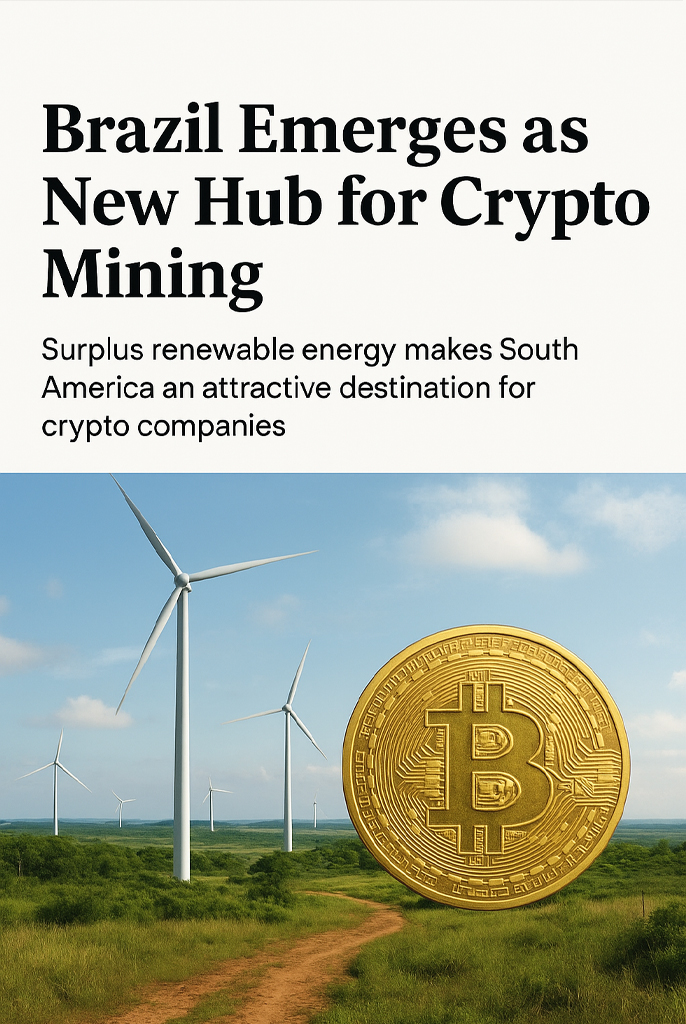Premium Biz Post – Brazil is rapidly gaining attention as a promising destination for cryptocurrency ventures. With an abundance of renewable energy sources such as wind, solar, and biomass, the South American nation has become a strategic focus for companies seeking sustainable operations. Brazil emerges as new hub for crypto mining, driven by its untapped clean energy potential and increasing government openness toward digital innovation.

Renewable Energy: Brazil’s Competitive Advantage
One of the strongest advantages Brazil holds is its energy landscape. The country generates more than 80% of its electricity from renewable sources, particularly hydropower, wind, and biomass. Unlike other regions where energy shortages and high electricity costs hamper large-scale mining, Brazil often produces surplus energy that goes unused.
Crypto miners, notorious for their energy-intensive operations, see this as a perfect match. By tapping into Brazil’s surplus electricity, mining companies not only reduce their operational costs but also position themselves as sustainable players in a sector often criticized for its carbon footprint.
This alignment between Brazil’s clean energy infrastructure and crypto’s growing demand for sustainable solutions is the foundation of the nation’s rising role in the global mining map.
Why Brazil, and Why Now?
The timing of Brazil’s emergence in the crypto mining industry is no coincidence. Several global developments make the country an attractive option:
- China’s Ban on Mining – After Beijing cracked down on mining activities in 2021, many companies relocated to Kazakhstan, Canada, and the U.S. However, rising energy costs and regulatory hurdles have limited their long-term prospects. Brazil, with its low-cost renewable surplus, now presents a more stable alternative.
- Rising U.S. Energy Prices – Despite hosting a major portion of the global hash rate, U.S. miners face increasing electricity costs and political scrutiny over their environmental impact. This has pushed many to explore international diversification.
- Government Openness – Brazil has shown a pragmatic stance toward blockchain and digital assets. Although regulations are still evolving, authorities acknowledge the potential of cryptocurrency in boosting innovation and investment.
The Environmental Debate
Bitcoin mining has long been criticized for its massive energy consumption. Environmentalists argue that mining contributes to climate change, especially when powered by coal or natural gas. Brazil’s situation, however, tells a different story.
Because of its vast reliance on renewables, crypto mining in Brazil has the potential to be one of the cleanest in the world. Miners utilizing surplus hydropower or wind energy are effectively making use of electricity that would otherwise go to waste.
This narrative could help reshape global perceptions of crypto mining, positioning Brazil as a leader in environmentally responsible blockchain infrastructure.
Economic Opportunities
The influx of mining operations could create several economic opportunities for Brazil:
- Job Creation: Establishing data centers, security services, and logistics operations will require local talent, potentially generating thousands of jobs.
- Technology Transfer: International companies setting up mining farms will likely bring advanced cooling systems, software, and monitoring technology to Brazil.
- Tax Revenue: With the government expected to regulate and license mining activities, tax revenue could increase significantly.
Additionally, as more mining farms develop in remote regions, they may also drive investments in local infrastructure, including roads, power grids, and internet connectivity.
Challenges Ahead
Despite the promising outlook, Brazil faces hurdles in becoming a global crypto mining powerhouse:
- Regulatory Uncertainty – While Brazil has not banned crypto mining, the absence of a clear legal framework could deter some investors. Establishing transparent rules will be critical.
- Energy Distribution – Although the country has surplus renewable energy, much of it is concentrated in specific regions. Expanding grid infrastructure to make it accessible for miners remains a logistical challenge.
- Public Perception – Even if powered by renewable energy, mining still consumes massive amounts of electricity. Public concern over whether miners might increase demand and raise local prices could become a political issue.
Read More : ”Natural Stone Carvings Beauty, Meaning, and Opportunity in Traditional Art’‘
Global Crypto Mining Landscape
To understand Brazil’s growing role, it’s useful to look at the global landscape.
- United States currently leads the world in Bitcoin hash rate, but regulatory pushback and environmental concerns are intensifying.
- Kazakhstan became a major player after China’s ban, but political instability and unreliable energy grids have made it less appealing.
- Canada offers renewable energy in regions like Quebec, yet its strict regulations limit scalability.
- El Salvador has experimented with geothermal Bitcoin mining, but its infrastructure is still limited.
Amid this, Brazil’s mix of stability, renewable abundance, and a growing digital economy makes it uniquely positioned to absorb more mining capacity.
Brazil and the Future of Digital Currency
Beyond mining, Brazil has ambitions to play a broader role in the digital currency ecosystem. The Central Bank of Brazil is piloting its own central bank digital currency (CBDC), known as the Drex. This move indicates that the government is open to embracing blockchain innovation while maintaining oversight.
The combination of a CBDC project and the arrival of crypto miners suggests Brazil may soon evolve into one of the world’s most influential digital finance ecosystems.
International Investment
Several major mining firms have already expressed interest in Brazil. Companies from North America, Europe, and Asia are reportedly exploring joint ventures with Brazilian partners. The lure of cheap renewable energy and political stability makes it a logical choice for expansion.
Additionally, Brazil’s proximity to major Latin American markets adds another layer of attractiveness. As adoption of cryptocurrency grows across the region, being physically close to consumers and traders can provide miners and blockchain firms with a competitive edge.
Potential Risks
It would be naive to assume Brazil’s crypto mining boom will proceed without obstacles. Global crypto markets remain volatile, with the value of Bitcoin and other digital assets subject to sudden swings. If prices drop significantly, mining profitability could collapse, leaving expensive infrastructure underutilized.
Moreover, if mining activity grows too quickly, it could strain Brazil’s energy grid in unexpected ways, particularly during dry seasons when hydropower generation dips. This would require careful planning and monitoring by both government and private stakeholders.
Looking Ahead
Brazil’s emergence as a crypto mining hub is not just about electricity—it’s about timing, policy, and sustainability. As the world shifts toward greener energy, Brazil stands at the intersection of renewable abundance and digital innovation.
For now, the opportunity is clear: by leveraging its surplus clean energy, Brazil can attract billions in foreign investment, generate jobs, and establish itself as a sustainable leader in global crypto mining.
If the government manages regulations wisely, balances public concerns, and continues supporting blockchain initiatives, Brazil could very well define the next chapter of the crypto economy.
The story of Brazil and cryptocurrency is only beginning. As more companies relocate operations and more policymakers engage with blockchain technologies, the nation’s influence in the digital economy will grow.
Brazil emerges as new hub for crypto mining not only because of its clean energy surplus but also because of its strategic vision to align technology with sustainability. With the right steps, it could become a blueprint for how nations worldwide can embrace innovation without sacrificing environmental responsibility.



